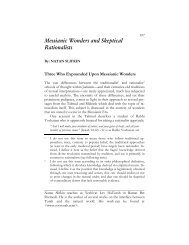Is There a Disconnect between Torah Learning and ... - Hakirah.org
Is There a Disconnect between Torah Learning and ... - Hakirah.org
Is There a Disconnect between Torah Learning and ... - Hakirah.org
You also want an ePaper? Increase the reach of your titles
YUMPU automatically turns print PDFs into web optimized ePapers that Google loves.
34 : Hạkirah, the Flatbush Journal of Jewish Law <strong>and</strong> Thought<br />
the halacha. Rav Samson Raphael Hirsch 35 writes that one reason<br />
that it is easier to teach children all of the middos other than obedience<br />
is because although they have models for the other middos, they do<br />
not have a model for obedience. He suggests that the child of<br />
observant parents will more easily learn obedience because “the freewilled,<br />
happy obedience which he (the child) sees his parents give to<br />
the comm<strong>and</strong>ments <strong>and</strong> prohibitions of this higher authority (the<br />
<strong>Torah</strong>) in every aspect of their daily lives may serve him as an<br />
inspiring example to follow.”<br />
3. Focusing on How We Teach Our Children about<br />
Middos<br />
a. Cognitive knowledge <strong>and</strong> underst<strong>and</strong>ing are not<br />
enough.<br />
In the field of Psychology there is a well known theory of Moral<br />
Development developed by Laurence Kohlberg. 36 This theory<br />
focuses on how the thought processes <strong>and</strong> underst<strong>and</strong>ing of children<br />
in the area of Morality <strong>and</strong> Ethics develop over the years, <strong>and</strong> how<br />
children come to have progressively higher comprehension of<br />
morality <strong>and</strong> ethics. The theory also gave rise to programs of<br />
instruction that aim to improve moral thinking. In these programs,<br />
children are presented with moral dilemmas with which to grapple. It<br />
was the belief of those designing <strong>and</strong> implementing the programs<br />
that the process of struggling with <strong>and</strong> offering solutions to moral<br />
dilemmas would effectuate improvement in moral thinking, which in<br />
turn would lead to improvements in moral behavior. Unfortunately,<br />
although changes in moral thinking may have come about in these<br />
programs, they were only moderately successful in changing moral<br />
behavior. As Kohlberg writes, “One can reason in terms of principles<br />
35 Hirsch, Rav Samson Raphael, “The First Years of a Child’s Life,” ibid.<br />
p. 135.<br />
36 For a comprehensive presentation of the theory <strong>and</strong> research, see<br />
Crain, William, Theories of Development, Fourth Ed. 2000, Prentice<br />
Hall, pp. 147–169.
















